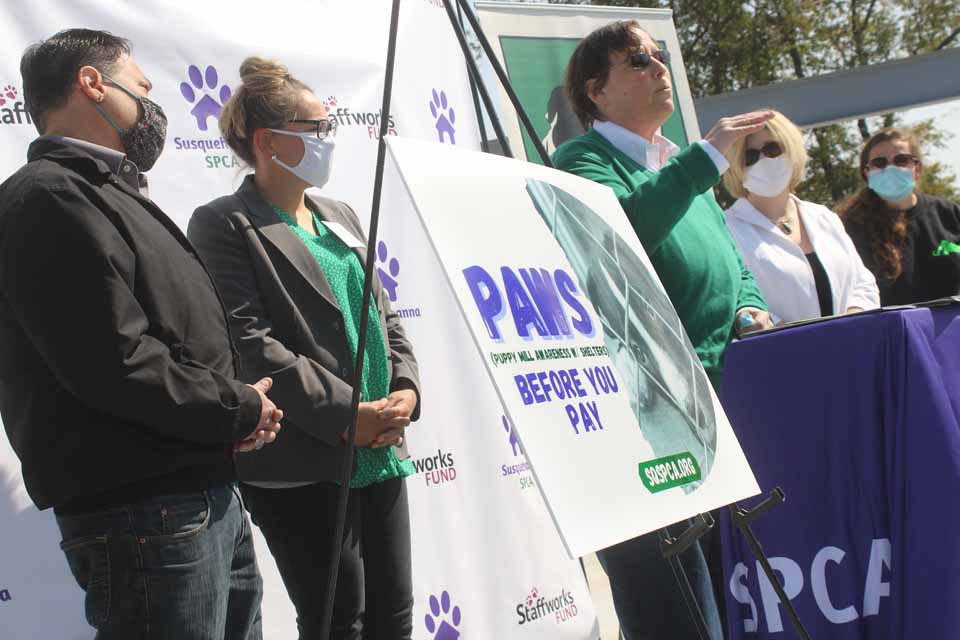SQSPCA Declares
War On ‘Puppy Mills’

By LIBBY CUDMORE • Special to www.AllOTSEGO.com
COOPERSTOWN – Brian Shapiro, state director of the Humane Society of the United States, has a strict warning for anyone who might be thinking about buying from a puppy mill.
“Underneath the cuteness, there is cruelty,” he said.
Shapiro was on hand for the Susquehanna SPCA’s announcement of the PAWS – Puppy Mill Awareness With Shelters – initiative, which seeks to educate people about the harm that puppy mills do to animals and consumers.
“Right here in Otsego County and throughout this region, we have active puppy mills,” said Stacie Haynes, SQSPCA executive director. “Puppy mills that operate their business in a cruel and inhumane way. Puppy mills that have already been shut down and continue to operate. Puppy mills that put on a façade with unsuspecting consumers who believe they are buying from a responsible dealer.”
She is aware of four operating in the county. “We have plenty of responsible breeders,” she said, “And we stand with them in this fight.”
A puppy mill, as Shapiro defined it, was any breeding operation “where an animal is treated like a widget coming off a machine.”
“These are dogs that languish in sub-par conditions,” he said. “A puppy mill is only there to make money.”
“I get calls from people all the time who got a puppy from ‘X’ and now their animal is sick with parvo,” a gastro-intestinal disease, said Libby Post, executive director of the state Animal Protection Federation.
“They can pay thousands of dollars in cash, but parvo is deadly in puppies, so that isn’t a guarantee. They may have to put the animal to sleep, which is heartbreaking.”
The major goal of PAWS, Haynes said, is educating the public on how to determine if someone is a reputable breeder or a puppy mill.
“A responsible breeder will encourage you to visit and see where the puppy was born and raised,” she said. “Responsible breeders will not keep dogs in crowded spaces or cages. The dogs will be in clean, roomy, comfortable areas.”
The SQSPCA – as well as the Delaware Valley Humane Society, the Animal Shelter of Schoharie Valley, the Catskill Humane Society and Super Heroes in Ripped Jeans – will all have PAWS resources on their websites to assist the public in making the right choice.
“Shelters should be a resource even if you’re not getting a dog from us,” she said. “You can call us up and say that you found a breeder, and we can give you those questions to ask so that you know you’re not buying from a puppy mill.”
In addition to education, PAWS will work with policymakers to strengthen Ag and Markets law and get more funding for inspectors to help shut puppy mills down.
“When people run for office, the question they should be asked is, ‘how do you feel about these issues?’” said Post. “It’s a bipartisan issue, and we need every elected official to know that people will not vote for them if they don’t care about companion animals.”
Greg Forester, a resident of Herkimer County, expressed worry that Amish puppy mills, which he said used “brokers” to sell their puppies, would skirt the laws.
“We don’t have cause to go into the barns, but I’ve found them suspended in cages,” he said.
“When Pennsylvania shut down puppy mills, the Amish moved them up here,” said Post.
“We support changes to the law,” said Shapiro. “At the end of the day, there are no brokers if people aren’t buying from a puppy mill. There is no reason, in 2020, to support a puppy mill.”

